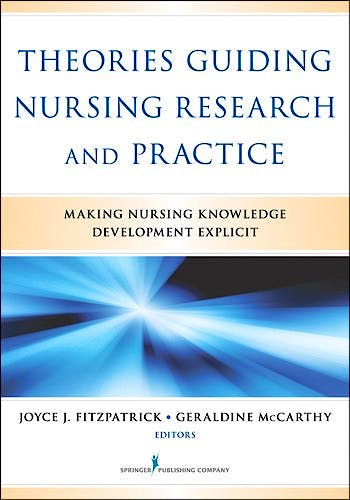

No hay productos en el carrito



Theories Guiding Nursing Research and Practice
Fitzpatrick, J.
1ª Edición Julio 2014
Inglés
Tapa blanda
372 pags
728 gr
18 x 26 x 2 cm
ISBN 9780826164049
Editorial Springer Publishing Co
LIBRO IMPRESO
-5%
112,80 €107,16 €IVA incluido
108,46 €103,04 €IVA no incluido
Recíbelo en un plazo de
2 - 3 semanas
Description
This book has its origins in courses taught by the editors and their collaborators for doctoral students. It therefore addresses the need to focus on how theories can be applied in the real world of clinical practice and the research based on it. Introductory and concluding sections make the case for the importance of theoretical frameworks when developing practice and research settings. Eighteen chapters cover individual theoretical approaches. While some, such as the theory of human caring and transformationalleadership theory, will be familiar to many readers in the UK, others cover new territory... SCORE: 4/5 stars." --John Adams , honorary research associate, Faculty of Nursing and Midwifery , Royal College of Surgeons in Ireland, Nursing Standard
This is the first book to clearly and fully demonstrate the process of using theory to guide nursing research and professional practice. It describes a step-by-step format for evaluating nursing theory's applicability to research, a format that links theory (both middle-range and grand theory) to research on a wide range of clinical populations and care delivery systems. The book describes how theory analysis models are used to examine various nursing phenomena as they relate to nursing research and professional practice, and provides key examples of how this is accomplished.
The book takes the reader through the process of using a theory to guide research from inception of a research question to evaluation of future research. International experts in theory-related nursing research describe twelve theories that have previously beenapplied to research and practice and six theories that can be applied to future research and practice. Using a consistent analytic framework, each chapter applies a specific theory (from either nursing, psychology, sociology, or management) to a particular clinicalpopulation or care delivery issue. These encompass clinical, administrative, and educational nursing settings. The consistent format facilitates ease of comparison across different theories. Generous use of figures and tables further demonstrates the complexrelationships between and among concepts embedded in the theories.
Key Features:
- Demonstrates a systematic format for evaluating middle-range and grand nursing theory's applicability to research
- Links theory to clinical practice at patient population and care delivery levels
- Provides a useful template for students of nursing disciplinary knowledge development
- Presents the scholarship of international researchers of theory-related nursing
- Includes theories from nursing, psychology, sociology, and management
Contents
Foreword
Pamela G. Reed
Preface
Joyce J. Fitzpatrick and Geraldine McCarthy
Part 1: Introduction
1. The Discipline of Nursing
Joyce J. Fitzpatrick
2. Extant Nursing Models and Theories: Grand and Middle Range Theories in Nursing
Mary Quinn Griffin and Margaret Landers
Part 2: Theories Applied to Research
3. Symptom Management Theory
Margaret Landers
4. Transitions Theory
Alice Coffey
5. Theory of Planned Behavior
Nicola Cornally
6. Social Support Theory
Patricia Leahy-Warren
7. Health Action Process Approach Theory
Elaine Lehane
8. The Judgment to Delay Model
Mairin O’Mahony
9. Progressively Lowered Stress Threshold Model
Mark Tyrrell
10. Cultural Competence Model
Karen Bauce
11. Interpersonal Relations Theory
Jeffrey Jones
12. Theory of Work Engagement
Margaret O’Connor Murphy
13. Sexuality in Women: Theoretical Perspectives
Vickie Cleary, Aileen Burton, and Josephine Hegarty
14. Acculturation Theory
Emerson Ea
Part 3: Theories Applied to Future Research and Practice
15. Story Theory
Patricia Prufeta
16. Self-Transcendence Theory
Jean Marie DiNapoli, Mary Joy Garcia-Dia, Leila Garcia-Ona, Deirdre O’Flaherty, and Jennifer Siller
17. Caring Theory
Catrina Heffernan
18. Transformational Leadership Theory
Robin Krinsky and Josiane Hickson
19. Empowerment Theory
Jean Marie DiNapoli, Deirdre O’Flaherty, and Mary Joy Garcia-Dia
20. Theory of Meaning
Elizabeth Weathers and Margaret Murphy
Part 4: Other Theory Dimensions
21. Theory Underlying Nursing Intervention Research
Bernadette Melnyk and Dianne Morrison-Beedy
22. Summary and Future Directions
Geraldine McCarthy and Joyce J. Fitzpatrick
Author
Geraldine McCarthy, PhD, MSN, MEd, DipN, RNT, RGN, Fellow RCSI,
is emeritus professor of nursing at the Catherine McAuley School of Nursing and Midwifery at University College Cork (UCC) and Chair of the South/South West Acute Hospital Group, which comprises nine hospitals in the south of Ireland. Prior to this, she wasfounding professor and dean of the nursing school at UCC, and held the post of head of the UCC College of Medicine and Health, providing strategic leadership in research and educational programs in medicine, dentistry, therapies, pharmacy, nursing, and midwifery. She has also held a variety of other positions in Ireland, the United Kingdom, the United States, and Canada. She holds an MEd from Trinity College Dublin, and MSN and PhD degrees in nursing from Case Western Reserve University, Cleveland, Ohio. She has been a member of a number of national and European bodies and her ministerial appointments include one to the Fulbright Commission. She has been the editor/author of a number of books and continually contributes to nursing publications.
© 2025 Axón Librería S.L.
2.149.0